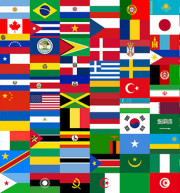
Special Rapporteur Maina Kiai has released 34 country background reports that he consulted in drafting his recent report comparing the enabling environments for businesses and civil society around the world. The Special Rapporteur's report, which is available here, was presented to the United Nations General Assembly in October 2015. It found that States and others often impose more burdensome regulation upon civil society, both in law and in practice, with businesses receiving more favourable treatment. The net result is that for businesses the enabling environment — defined broadly as action or inaction by States and other actors to promote a particular non-State sector — is typically much better than it is for associations. The country background reports were prepared by pro bono counsel for the American Bar Association's Center for Human Rights, which coordinated the research on behalf of the Special Rapporteur. They provide an overview of the legal environment for both businesses and non-profit associations in 34 countries, focusing on: (1) registration procedures, (2) tax laws, (3) financial transaction laws, (4) auditing and reporting requirements, (5) and penalties for non-compliance with the law. Limited time and resources dictated that research could not be commissioned on all 193 UN... Continue reading →

NEW YORK/GENEVA – Civil society’s contributions to a nation’s wellbeing are just as important as those made by businesses, UN expert Maina Kiai told the UN General Assembly today. He called on States to give the same level of respect and create enabling environments for civil society groups, just as they do for companies. Speaking during the presentation of his latest report, which compares the operating environments for commercial and civil society sectors worldwide, Kiai said that it was clear that businesses generally operate in better environments than non-profit entities – largely because States go to great lengths to create such facilitating environments. Unfortunately, governments make comparatively little effort to improve conditions for civil society, resulting in its marginalization. “There is no compelling reason why the civil society sector should have to operate in such a hostile environment, when it is possible for States to do much more to facilitate and promote a more enabling environment, like they do for businesses,” said Kiai, who is the Special Rapporteur on the rights to freedom of peaceful assembly and of association. “Both sectors, after all, are equally deserving of promotion by the State, and both contribute enormously to the overall wellbeing of a... Continue reading →

NEW YORK - United Nations Special Rapporteur Maina Kiai will appear before the UN General Assembly on Oct. 27 to present his latest report, which compares States’ treatment of businesses and civil society, with an eye towards elevating conditions for the latter. Kiai’s presentation is scheduled to begin at approximately 11 a.m. (US Eastern Standard Time), and will be broadcast live on webtv.un.org. The report, which is available here, compares the so-called “enabling environments” that States, multilateral organizations and other actors create for businesses and associations, and highlights instances where they are treated inequitably. Businesses were chosen as a point of comparison for the report because they share some similarities with associations and due to the fact that they frequently occupy a place of privilege in many countries. The Special Rapporteur concludes that States would better promote and protect the rights to freedom of peaceful assembly and of association if they elevated their treatment of associations to similar levels as their treatment of businesses. “If a business can register as a legal entity in a few hours without significant government interference, as in Rwanda, why is the procedure significantly different for associations?” Kiai writes in the report.... Continue reading →

The Special Rapporteur’s factsheet summarizing his "sectoral equity" report, which examines differential treatment of businesses and associations. This factsheet draws heavily from the Special Rapporteur’s 2015 report to the UN General Assembly and features guidance on: • States' obligation to create the best possible enabling environment for civil society • The concept of "sectoral equity" between businesses and associations - and details of exactly what this means • Permissible and impermissible restrictions on associations – with an analysis how these restrictions are often stricter than those for businesses • Examples of instances where States create drastically better enabling environments for businesses than for associations • Conclusions, recommendations, and more For the Special Rapporteur’s full factsheet series, please see:... Continue reading →

In this report, Maina Kiai's third to the United Nations General Assembly, the Special Rapporteur compares the enabling environments that States, multilateral organizations and other actors create for businesses and associations, and highlights instances where they are treated inequitably. Although businesses and associations are distinct bodies that pursue different motives, they share similarities, most notably that they are both non-State actors and vehicles to unite people to pursue a particular goal, whether economic, political, social, cultural or otherwise. Despite those similarities, the Special Rapporteur has found that States and others often impose more burdensome regulation upon associations, both in law and in practice, with businesses receiving more favourable treatment. The net result is that for businesses the enabling environment — defined broadly as action or inaction by States and other actors to promote a particular non-State sector — is typically much better than it is for associations. Businesses were chosen as a point of comparison for this report not only because of their similarities with associations, but also because they frequently occupy a place of privilege. “We live in an era where political discourse often revolves around the economy, jobs and growth,” Kiai... Continue reading →

At first glance, the business and civil society sectors may seem strange bedfellows for a comparative study. In the mind of the public and policymakers, these two entities appear distinct, warranting separate rules and treatment. The basis for this treatment seems to boil down to one dividing point: One exists to make a profit; the other is non-profit. But beyond their dissimilar profit motives, are businesses and associations really that different? Both are non-state actors, potential employers, providers of goods and services, magnets for investment, and possible platforms for mobilizing people and influencing policy. Both are crucial to economic and political development, both domestically and internationally. And both have potential to enhance the protection and promotion of human rights. Despite these sweeping similarities, the UN Special Rapporteur on the rights of freedom of assembly and association Maina Kiai has observed over the past four years that many governments do, in fact, single out CSOs for special treatment – not all of it good. The reasons for this difference in treatment are not always clear, and are often suspicious on their face. In some countries, for example, a business can be registered in a matter of hours, while NGO registration can take months. In others, it is forbidden... Continue reading →